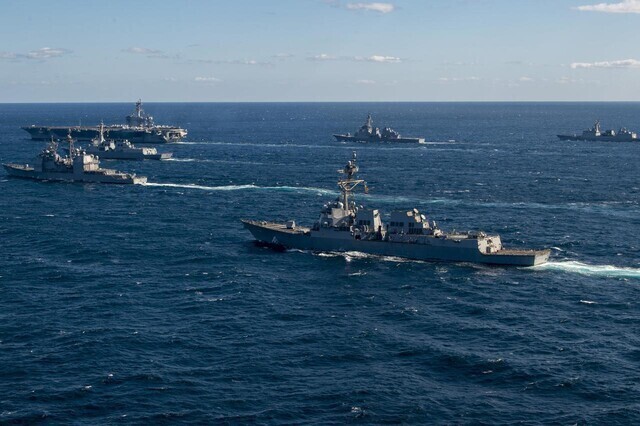hankyoreh
Links to other country sites 다른 나라 사이트 링크
[Column] There’s more to security than deterrence


By Moon Chung-in, James Laney Distinguished Professor at Yonsei University
The prospect of a crisis on the Korean Peninsula is on everyone’s lips in the US. According to Radio Free Asia’s Korean edition, the most popular search terms related to North Korea in the US in the month of January were “Is North Korea going to war with us?” and “Is North Korea preparing for war?”
The place being named as the next hotspot after Ukraine and Gaza is not Taiwan, but the Korean Peninsula. That shows how severe the “Korea risk” has grown, and the Korean stock market has been nosing downward accordingly.
The South Korean government’s attitude is unyielding. Seoul holds that there’s no reason to fear because South Korea’s alliance with the US and its military cooperation with the US and Japan provide ample deterrence against North Korea, and also because South Korea and the US are upgrading extended deterrence as a concerted response to the threat of North Korea’s nuclear weapons and missiles.
Experts and figures in the US government believe that while the possibility of a minor military clash between South and North Korea cannot be ruled out, South Korea and the US’ current deterrence is enough to prevent the outbreak of a large-scale war and to maintain the status quo on the Korean Peninsula.
But a considerable number of people hold a contrary view. Robert Carlin and Siegfried Hecker, who recently raised eyebrows with their suggestion that Kim Jong-un has decided on a course of war, said that South Korea and the US have been “hypnotized by deterrence” and need to come up with a new plan that goes beyond that.
In fact, the word “deterrence” derives from the Latin “deterrere,” which could literally be translated as “away from fear.” But despite South Korea and the US’ powerful deterrence, security anxiety and fear on the Korean Peninsula only seem to be increasing. In short, deterrence is proving dysfunctional. Why could that be?
The primary cause can be found in fundamental changes in our strategy of deterrence against the North. South Korea and the US’ traditional strategy of deterrence was based on “escalation management,” which was designed to convince North Korea that it stood to lose much more than it would gain from carrying out military action against South Korea.
But the strategy that has been emphasized since Yoon Suk-yeol became president of South Korea is “escalation dominance,” which consists of demonstrating that South Korea is capable of inflicting much more damage in response to North Korean provocation, even at the risk of escalating hostilities. Some leading examples of aggressive or offensive methods of deterrence are preemptive strikes, massive retaliation and decapitation strikes. The same goes for nuclear deterrence against North Korea, which South Korea and the US have augmented while institutionalizing talks about extended deterrence.
Significantly, South Korea and the US have gone beyond military deterrence by simultaneously pursuing a strategy of what is called “compellence,” or attempting to change North Korean policy through diplomatic and military means. That includes the push for Pyongyang to accept complete, verifiable and irreversible denuclearization, or CVID.
North Korea has responded to this strategy of aggressive deterrence and compellence by strengthening its nuclear weapons and missile programs. In the resulting standoff, it is only natural for the arms race to intensify and for strategic instability to grow.
The contradiction between deterrence and reassurance is another factor behind the dysfunction of deterrence against North Korea. Since attitudes about deterrence vary considerably in each country, it’s impossible to objectively gauge how much deterrence against the North would be reasonably adequate.
National defense officials in the US generally regard conventional and nuclear deterrence against North Korea as being adequate. Surprisingly enough, North Korea appears to have the same viewpoint. North Korea’s leaders believe that the US has the capability, intention and will to launch a strike on Pyongyang whenever they show the slightest vulnerability.
That’s why North Korea has such an extreme overreaction whenever the US toughens its military posture toward the North to the slightest degree, such as by upgrading joint military exercises with South Korea or deploying strategic weapons on the Korean Peninsula. That’s probably also why North Korea keeps working to expand its nuclear weapon and missile programs.
In South Korea, however, there’s nearly endless skepticism about the US’ deterrence and security pledges vis-à-vis North Korea. That skepticism is reflected in Seoul’s constant requests for more extended deterrence. One aggravating factor here is the fickle nature of domestic politics in the US.
So to assuage that doubt and discontent, the US provides stronger measures of reassurance, which leads to even stronger pushback from North Korea. In the end, this vicious circle only worsens the strategic instability on the Korean Peninsula.
It’s no easy matter for the US to provide “double assurance,” in which it makes a definite security pledge to South Korea while simultaneously convincing North Korea that it doesn’t intend to make a first strike.
In light of all this, increasing military deterrence by itself is not some silver bullet that can prevent war on the Korean Peninsula while also guaranteeing peace and security. Strictly speaking, it’s more of a stopgap solution that temporarily alleviates security fears.
The search for strategic stability on the Korean Peninsula requires us to devise methods of deterrence that are capable of minimizing the interminable cycle of the security dilemma.
Furthermore, we need a fresh vision that can transcend deterrence and compellence. It’s time to recall the old geopolitical maxim that both deterrence and negotiations are needed for lasting security and peace.
Please direct questions or comments to [english@hani.co.kr]

Editorial・opinion
![[Guest essay] Preventing Korean Peninsula from becoming front line of new cold war [Guest essay] Preventing Korean Peninsula from becoming front line of new cold war](https://flexible.img.hani.co.kr/flexible/normal/500/300/imgdb/original/2024/0507/7217150679227807.jpg) [Guest essay] Preventing Korean Peninsula from becoming front line of new cold war
[Guest essay] Preventing Korean Peninsula from becoming front line of new cold war![[Column] The state is back — but is it in business? [Column] The state is back — but is it in business?](https://flexible.img.hani.co.kr/flexible/normal/500/300/imgdb/original/2024/0506/8217149564092725.jpg) [Column] The state is back — but is it in business?
[Column] The state is back — but is it in business?- [Column] Life on our Trisolaris
- [Editorial] Penalties for airing allegations against Korea’s first lady endanger free press
- [Editorial] Yoon must halt procurement of SM-3 interceptor missiles
- [Guest essay] Maybe Korea’s rapid population decline is an opportunity, not a crisis
- [Column] Can Yoon steer diplomacy with Russia, China back on track?
- [Column] Season 2 of special prosecutor probe may be coming to Korea soon
- [Column] Park Geun-hye déjà vu in Yoon Suk-yeol
- [Editorial] New weight of N. Korea’s nuclear threats makes dialogue all the more urgent
Most viewed articles
- 1Yoon’s broken-compass diplomacy is steering Korea into serving US, Japanese interests
- 2[Guest essay] Preventing Korean Peninsula from becoming front line of new cold war
- 3South Korean ambassador attends Putin’s inauguration as US and others boycott
- 4Yoon’s revival of civil affairs senior secretary criticized as shield against judicial scrutiny
- 5Behind-the-times gender change regulations leave trans Koreans in the lurch
- 6Family that exposed military cover-up of loved one’s death reflect on Marine’s death
- 7Japan says its directives were aimed at increasing Line’s security, not pushing Naver buyout
- 8Amid US-China clash, Korea must remember its failures in the 19th century, advises scholar
- 9Lee Jung-jae of “Squid Game” named on A100 list of most influential Asian Pacific leaders
- 10S. Korean first lady likely to face questioning by prosecutors over Dior handbag scandal